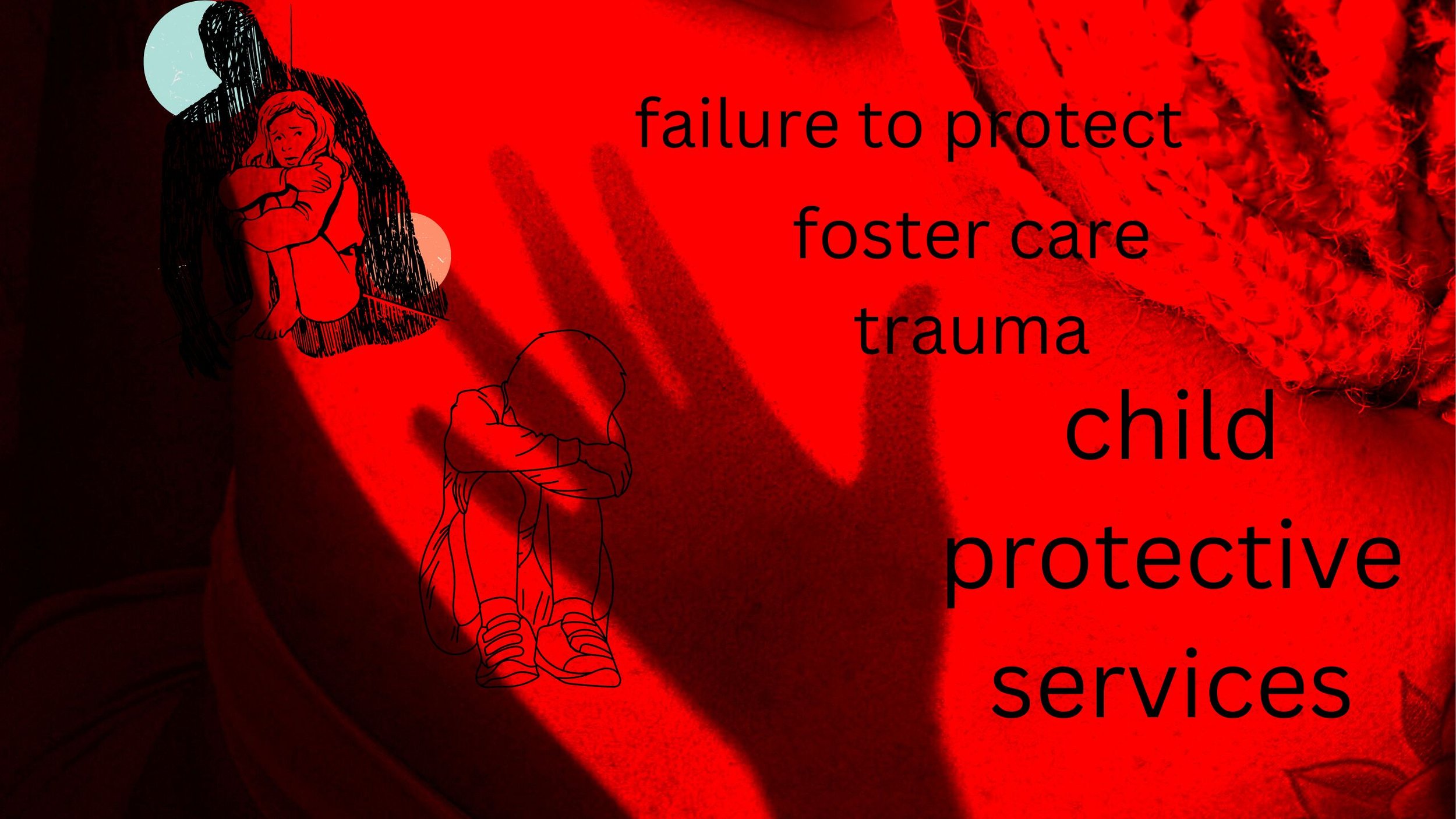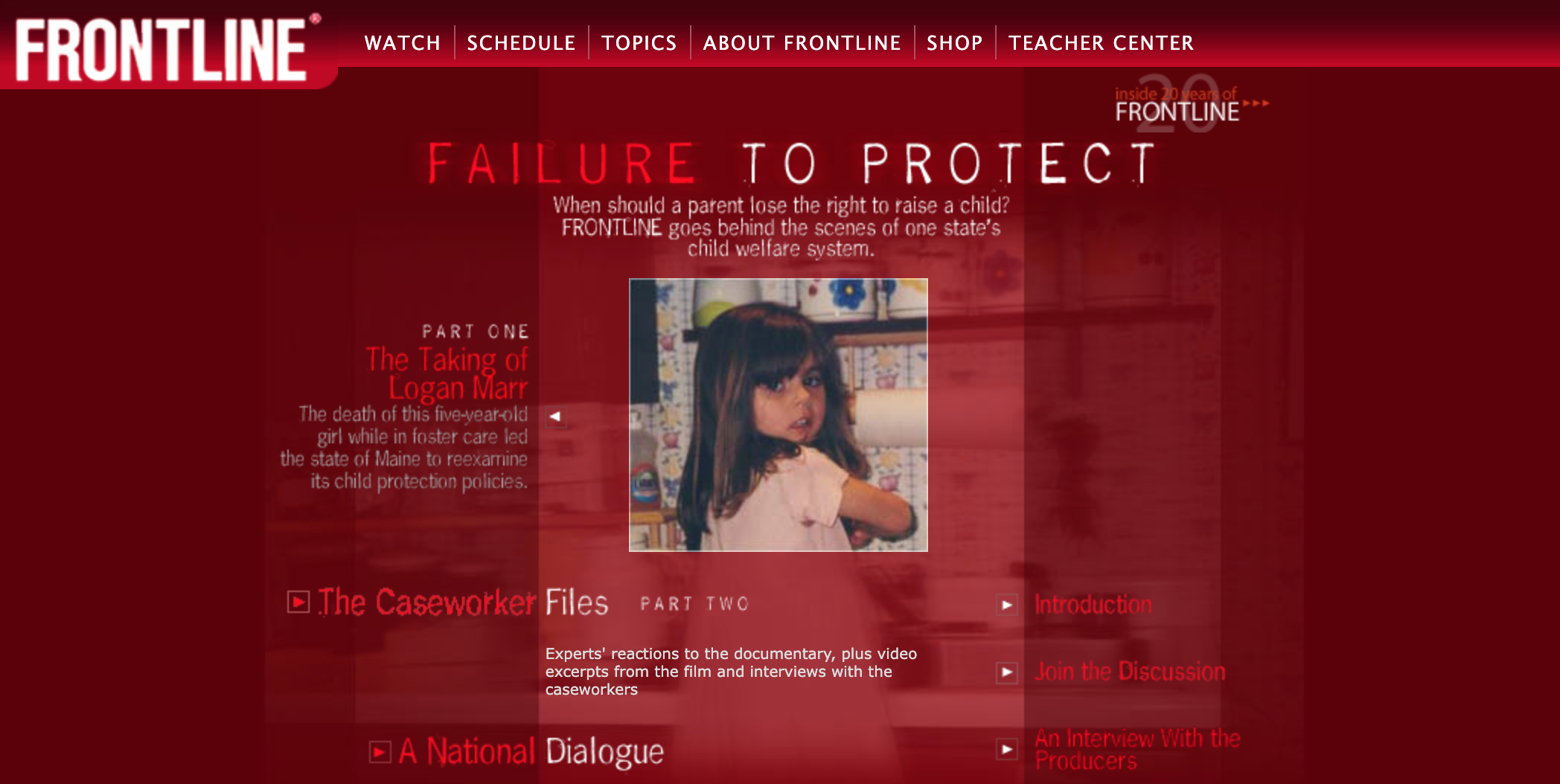Failure to Protect is the name of a PBS Frontline documentary looking into how five-year-old Logan Marr who had never been abused by her mother was found dead in her foster mother’s home in Maine in 2001.
The press release for the film asks: “Why did the state remove Logan from her biological mother despite no evidence of any physical or sexual abuse? Did the Department of Human Services move too quickly to terminate her mother's parental rights?”
In Nevada, the wording “Failure to Protect” appears as part of the Child Welfare Policy Manual for the Nevada Division of Child and Family Services.
It’s defined as “the circumstances of the parent responsible or caregiver's supervision are such that a reasonable person would be expected to foresee that the child would be placed at plausible risk of harm from the actions or inactions of another adult. The parent or responsible caregiver is responsible for maltreatment inflicted by substitute caregivers or others, or for child endangerment, if the parent knew or should have known the child was at plausible risk of physical harm of being harmed by another person.”
In a phone interview, the Children’s Serviced Division Director for the Washoe County Human Services Agency, Ryan Gustafson pointed instead to the Nevada Administrative Code NRS 432B. “It's tied into the expectations and the mandatory requirements of Washoe County as a child welfare entity, for the protection and safety of children under NRS 432 B. It’s actually more of a discussion around child abuse and neglect,” Gustafson explained. “And that comes in a variety of forms, right? Physical abuse, emotional abuse, sexual abuse and neglect comes in various forms too. So when we talk about failure to protect, it's more specific to the statute in that as a primary caregiver, you have a responsibility for the safety and welfare of your child.”
Amanda (we changed her name for the privacy of her children) lives in Clark County now. She had been coming back to Reno every other week, until recently, to see her two sons during supervised visits with a therapist. Both are now in foster care and she fears they are slipping away from her. She feels she’s a victim of both domestic violence and this failure to protect. A recent Facebook post indicated visits with one of her sons had been discontinued due to a recent psychiatric report.
“I’m charged with failure to protect which basically faults the survivor of domestic violence for their children witnessing the domestic violence. I didn't protect my kids from witnessing that domestic violence,” she explains. “So my kids were removed from me. The crazy thing is that I have two of my children, but I do not have the other two. So I have twin daughters, who are toddlers (from a different partner), but my two older boys are gone, because of this failure to protect with Washoe County.”
She’s been without her two older boys, who are six and eight now, for two years. There’s an upcoming trial, scheduled for April. She says this situation, sadly shared by many other local moms, is making more of them less likely to report domestic violence. We were unable to independently verify her accounts due to the private nature of such cases.
“One in four women experience domestic violence,” Amanda told Our Town Reno. “75% of women who do experience domestic violence have children. And so if the police are called CPS does get involved, then they can put this failure to protect on the victims of domestic violence. The non-offending parent, they can put this on them, which has been done to me, and it can be the reason they remove your kids from the home. With domestic violence, already 50% of cases go unreported. So there's already 50% of victims who are too scared to report this. And with this, even more women are hearing about CPS taking children from homes and are too scared to report it. So at that point, it becomes a public safety issue because there's abusers doing this to women and getting away with it.”
Amanda says the determining incident in her life happened when she was trying to get her kids back from their father who had been granted custody, but she felt they weren’t being treated right. “Me and him were not in a relationship. I was telling my boys, all right, get your stuff, go pack your bags. We are getting out of here, you know, you're not living here anymore. When I put them in the car, he dragged me out of the car, hit me and cut my hair off,” she said. That’s when she called the police but soon realized the outcome she was hoping for would not materialize.
“The police told me, how do we know you didn't do that to yourself? I'm like, what? Why would I chop all my own hair off? Like, I had long, pretty blonde hair. And they just went and he just held me down and cut it off. And I was like, why would I do that to myself? And he didn't have a single charge.”
Amanda says she was able to keep her boys in a hotel for a few days, but after that she says CPS took them from her, put them back into the father’s custody and then later in the foster care system. Her account could not be independently confirmed. CPS does not discuss specific cases.
Amanda initially spent four months in a domestic violence shelter, where she said other women shared similar ordeals.
“And so a lot of domestic violence victims today are saying, if I had the chance, I would never have talked to the police. Because look at me now. My kids are gone. I have nothing. And most of the time the abuser isn't even in jail, while my kids are suffering even more trauma,” she said.
“Other women also regretted going to the police,” Amanda said. “The police call CPS and CPS immediately takes their kids away. They're the ones left fighting. The women are left fighting for these kids, and they're already dealing with their own trauma from being abused. And what CPS doesn't consider is that domestic violence and abusive relationships are so complex. There's financial abuse to where the woman doesn't feel like she can leave. And so CPS fault these women for not leaving, but they don't consider how complex it is to where the woman is only trying to keep herself and her kids as safe as she can because she knows if she tries to leave, [it’s going to get even worse.] And there's battered women's syndrome and it's so complex. And CPS doesn't take that into consideration at all. They don't get it. The judge doesn't get it. CPS doesn't get it. And so there's a lot of women saying, I wish I never said anything.”
“As a child welfare agency, what we want to do is provide opportunities for parents and the non-offending parent to get the resources that they need, right? And so, ideally we want kids and families to be reunified,” Gustafson, the Washoe County official reiterated several times in our phone interview. “If a mom calls and says, dad abuses me and dad abuses our child, but I am going to go back with dad anyways… yes that's a concern, right?” he said addressing the fears of abused women. “Because now mom becomes unsafe and the child becomes unsafe. And certainly we would want to have a discussion about what is it that is having you go back knowing you're in that environment? Is it because of the long-term relationship you've had? Is it because you need resources? Is it because you need shelter, because you need food? What is it? Can we help provide some of that stuff so you don't have to go back into that environment? Or is there a misunderstanding or is there something that we can provide you and him?” He said he used the mom and abusive dad as an example in his quote, but that there were a wide variety of scenarios.
Amanda now works as a medical assistant. Online, she posts photos of her smiling daughters, but she says she doesn’t feel whole without her two boys in her care.
“I’ve been fighting for them ever since,” she said. “They [CPS] told me, get your own apartment and then we'll give you your sons back. So I get my own apartment. And that was two years ago. And ever since I've been fighting. I've got a job, I've got money. I've never abused my sons. I've never used drugs ever in my life.”
Amanda takes inspiration from the Nicholson v. Williams case in 2004, when the New York Court of Appeals unanimously held that a mother's inability to protect a child from witnessing abuse does not constitute neglect, and therefore cannot be the sole basis for removal.
In other states, though, failure to protect has sometimes led to jail time. In August 2022, Mother Jones wrote: “In Oklahoma, failure to protect is the only child abuse charge levied predominantly against women, and it is disproportionately charged against women of color. People charged with the crime there are less likely to have a previous felony record than defendants in firsthand child abuse cases—a sign of just how much more dangerous abusers are than those accused of failing to stand in the way of their abuse. Since 2009, when the latest version of the state’s law went into effect, at least 139 women have been imprisoned solely for failure-to-protect charges. At least 55 are still incarcerated.”
In our interview Gustafson wanted to make clear that “as a child welfare division director, I don't have the authority to incarcerate, you know, or convict anyone of a crime. We look at it from the child abuse and neglect standpoint.” He also said Washoe County looks closely to see if any of their work leads to racial inequities. “We actually have a statewide work group that pulls data, that looks at data and helps come up with statewide plans to ensure that we are looking at and analyzing differences, when it comes to race, when it comes to really, you know, any special set of factors,” he said.
Her ex, Amanda says, is now siding with her to get her parental rights back, but she fears it might be a losing cause for everyone involved, including her boys.
“I can't imagine them being in foster care any longer that they should be here because I am a safe parent and I have custody of my other kids,” she said. “And if I'm safe now, I should be safe forever. And I just love them and I'm never going to stop fighting to have them because I know that this is where they'll be happy.”
She says she’s been pressured to settle to get one letter a year from her sons, “or you can go to trial and, potentially lose and you'll have nothing. Obviously I was like, I'm going to take the risk and go to trial,” she said, even if her attorney thinks she will lose.
“I'm like, how is this happening to me? This can't be my life. I'm a good mom,” she concluded in disbelief.




